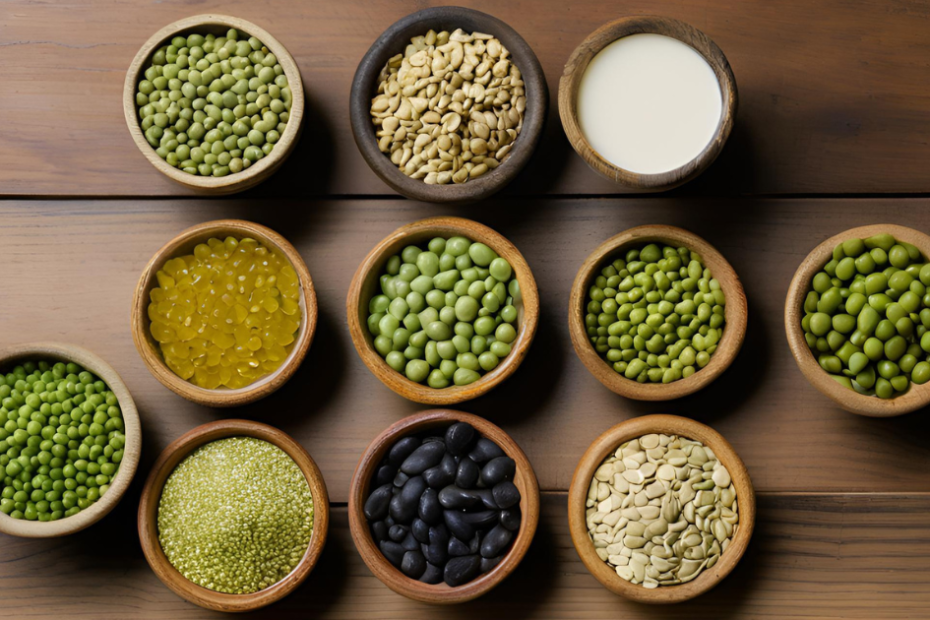For vegan athletes, muscle recovery isn’t just about protein—it’s about precision. Branched-chain amino acids (BCAAs) are critical for repairing muscle tissue, reducing soreness, and enhancing endurance. Yet, plant-based diets often fall short of delivering optimal BCAA ratios. In this 1,200-word deep dive, we explore how to harness vegan BCAAs effectively, backed by clinical research, food synergies, and supplement strategies.
Why BCAAs Matter for Muscle Recovery
BCAAs—leucine, isoleucine, and valine—make up 35% of muscle protein. Unlike other amino acids, they bypass the liver and are metabolized directly in skeletal muscle, playing key roles in:
- Muscle Protein Synthesis (MPS): Leucine activates the mTOR pathway, triggering muscle repair (NIH Study).
- Reducing Catabolism: BCAAs prevent muscle breakdown during prolonged exercise or calorie deficits.
- Fatigue Resistance: Valine and isoleucine lower serotonin uptake in the brain, delaying mental exhaustion.
The Vegan Challenge:
Most plant proteins (e.g., rice, peas) are lower in leucine than whey. Achieving the ideal 2:1:1 ratio (leucine:isoleucine:valine ) requires strategic sourcing.
Top 5 Vegan BCAA Sources: From Food to Supplements
1. Fermented Soy: The BCAA Powerhouse
- Examples: Tempeh, natto, soy protein isolate.
- BCAA Content: Tempeh delivers 6.7g BCAAs per 100g, with 2.8g leucine—the highest plant-based source.
- Science: A 2021 Nutrients study found fermented soy boosts bioavailability of amino acids (PubMed).
- Tip: Pair with vitamin C-rich foods (bell peppers, citrus) to enhance iron absorption for muscle oxygen delivery.
2. Lentils + Rice: The Dynamic Duo
- BCAAs: 1 cup cooked lentils + 1 cup brown rice = 5.2g BCAAs (2.1g leucine).
- Synergy: Rice compensates for lentils’ methionine deficiency, creating a complete protein.
- Study: Research in The American Journal of Clinical Nutrition confirms plant protein combos match animal proteins for muscle growth when properly balanced (AJCN).
3. Hemp Seeds: Omega-3s and BCAAs
- BCAAs: 5.2g per 30g serving (2.2g leucine).
- Bonus: Omega-3s reduce exercise-induced inflammation (NIH).
- Usage: Blend into post-workout smoothies or sprinkle on oatmeal.
4. Pea Protein Isolate: The Supplement Star
- BCAAs: 5–6g per scoop (2.5g leucine).
- Research: A 2019 Sports Medicine trial showed pea protein stimulates MPS as effectively as whey when leucine thresholds are met (PubMed).
- Pro Tip: Combine with pumpkin seed protein for a balanced amino acid profile.
5. Vegan BCAA Supplements
- What to Look For:
- Fermented BCAAs: Derived from non-GMO corn or quinoa (e.g., Thorne Vegan BCAA).
- 2:1:1 or 4:1:1 Ratio: Higher leucine for MPS activation.
- Third-Party Tested: NSF Certified or Informed Sport for purity.
- Top Picks:
- Transparent Labs Vegan BCAA: 5g BCAAs per serving, flavored with stevia.
- Myprotein Vegan BCAA: Budget-friendly with added glutamine.
Dosing Strategies for Optimal Recovery
Pre-Workout (30–60 Minutes Prior)
- 5–10g BCAAs to prime muscles and reduce fatigue.
- Add Carbs: Pair with 20g oats or a banana to spare glycogen.
Intra-Workout (For Sessions >90 Minutes)
- 5g BCAAs in 500ml water to prevent catabolism during endurance training.
Post-Workout (Within 30 Minutes)
- 10g BCAAs + 20g plant protein (e.g., pea/rice blend) to maximize MPS.
- Leucine Threshold: Studies suggest 3–4g leucine per meal to activate mTOR (NIH).
Plant-Based vs. Whey BCAAs: A Detailed Comparison
| Factor | Plant-Based BCAAs | Whey BCAAs |
|---|---|---|
| Digestibility | Gentle on gut; no lactose | May cause bloating in 65% of adults (NIH) |
| Sustainability | 50% lower CO2 emissions | High water/land use |
| Amino Acid Profile | Requires strategic combos | Naturally complete |
| Cost | ~0.30–0.30–0.50 per serving | ~0.25–0.25–0.40 per serving |
| Muscle Recovery | Equal efficacy when dosed correctly | Faster absorption |
BCAAs and Muscle Soreness: What the Science Says
- DOMS Reduction: A 2017 meta-analysis of 18 trials found BCAA supplementation reduced delayed-onset muscle soreness by 33% (NIH).
- Mechanism: BCAAs lower creatine kinase levels, a marker of muscle damage.
- Vegan Advantage: Plant-based diets’ anti-inflammatory properties (from polyphenols, fiber) further accelerate recovery (Frontiers in Nutrition).
Common Mistakes to Avoid
- Skipping Leucine Thresholds: <3g leucine post-workout blunts MPS.
- Ignoring Timing: BCAAs are most effective when consumed near workouts.
- Overlooking Whole Foods: Supplements shouldn’t replace BCAA-rich meals.
FAQ: Expert Answers
1. Can I build muscle on plant BCAAs alone?
Yes—studies show vegan athletes gain muscle mass comparably to omnivores when protein and leucine intake are sufficient (PubMed).
2. Are BCAAs safe long-term?
Yes, but avoid exceeding 35g/day to prevent imbalanced amino acid uptake.
3. Do BCAAs break a fast?
Technically yes (they trigger metabolic responses), but they’re low-calorie (10–20 kcal per serving).
4. Best BCAA source for endurance athletes?
Hemp seeds + tart cherry juice—omega-3s and antioxidants combat inflammation.
5. Can BCAAs replace a post-workout meal?
No—pair them with carbs and fats for sustained energy.
Conclusion
Plant-based BCAAs are a non-negotiable tool for vegan athletes aiming to optimize recovery and performance. By combining leucine-rich foods like tempeh and pea protein with targeted supplementation, you can rival—or surpass—the results of traditional whey-based regimens. Prioritize whole foods, meet leucine thresholds, and track your progress to unlock peak performance.
Pro Tip: Use a BCAA + creatine combo (5g each) post-workout for amplified strength gains.
Read also: Top 5 Natural Supplements for Muscle Gain: Build Strength Safely in 2025
